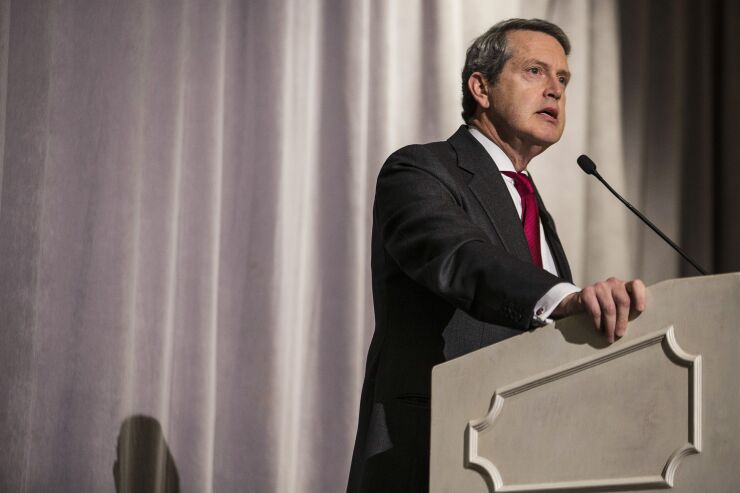Randal Quarles, the Federal Reserve’s vice chair of supervision, told lawmakers that the Fed's lending is a backstop for municipalities and that it may not be an answer to all issues facing state and local governments.
That was his message during a Senate Banking Committee hearing on Tuesday. During the hearing, Sen. Jack Reed, D-R.I., said more support for state and local governments is needed.

“It is critical to do that because I hear not only from my governor, but governors across the nation that they’re running into really difficult choices in terms of cutting public services and raising taxes, and without additional support, they’ll have to do that, which I don’t think will help stimulate the economy or aid in a recovery,” Reed said.
Quarles said the Fed provides backstop lending, a repeated message from the Fed.
“I think you need to draw a distinction between the types of support that the Fed provides, which is backstop lending, which for many state and local governments, may not be the answer to their issues,” Quarles said.
The Fed’s Municipal Liquidity Facility was created in April, and the Fed has said it is meant to serve as a backstop for borrowers. The MLF also has limitations for eligible issuers and is open to counties with populations of 500,000 or more and cities of 250,000 or more. In June, the central bank allowed U.S. states to be able to have at least two cities or counties eligible to directly issue notes regardless of population. Governors of each state are also able to designate two issuers whose revenues are derived from activities such as public transit and tolls.
Quarles also said he could only speak to what the Fed could do in helping municipalities.
“With respect to municipalities, I think I can speak to what the Federal Reserve can do and the decision to provide the broader range of support would be something for the Congress to debate at this time,” Quarles said.
Later, Sen. Jon Tester, D-Mont., asked Quarles whether another relief bill was needed to help municipalities, small businesses, and others.
“I think that as a central banker, I should leave those decisions to the Congress,” Quarles said.
Last week, Democratic lawmakers penned a letter to Powell and Secretary Treasury Steven Mnuchin asking for changes to the MLF and other facilities. Virginia Sen. Mark Warner, Massachusetts Sen. Elizabeth Warren, Ohio Sen. Sherrod Brown and New York Sen. Chuck Schumer signed it.
To address economic challenges caused by the pandemic, the lawmakers said both fiscal stimulus from Congress and effort from the Fed and Treasury were needed, such as extending the MLF past its expiration date of Dec. 31, 2020.





